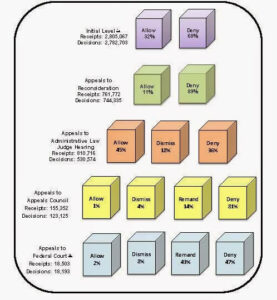
Illiteracy is not considered to be a medical condition by the Social Security administration. It is considered to be a level of education. Therefore, a claimant cannot draw disability on the basis of illiteracy, alone.
However, claimants who have serious medical conditions, and are also illiterate, sometimes have a better chance of qualifying for benefits than those who can read. This is because Social Security’s rules recognize that people who cannot read have a reduced ability to change occupations.
For Social Security purposes, illiteracy does not mean the same thing as functional illiteracy. Functional illiteracy means reading at the third grade level or below. For Social Security purposes, however, illiteracy means the inability to read or write. A person is considered illiterate if the person cannot read or write a simple message such as instructions or inventory lists – even though the person can sign his or her name. This is a very strict standard for what constitutes illiteracy.
Nevertheless, for some individuals, being totally illiterate is important to their claims. For example, a person 45 years old with a limited education, and a work history that is unskilled, or no work history, would not be considered disabled if able to perform work in a seated position. However, if the same claimant were totally illiterate, he would be considered disabled if he were limited to seated work.
Have You Been Injured In An Accident? Contact Pilzer Klein Law
(864) 235-0234In these instances, if there is evidence that the claimant may be illiterate, and cannot perform his past relevant work, the Social Security Administration has the burden of proving that the person is not illiterate. The agency may send the claimant out for a literacy evaluation to determine whether he can read.
Call or text (864) 235-0234 or complete a Free Case Evaluation form





